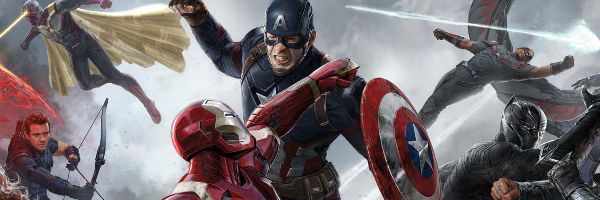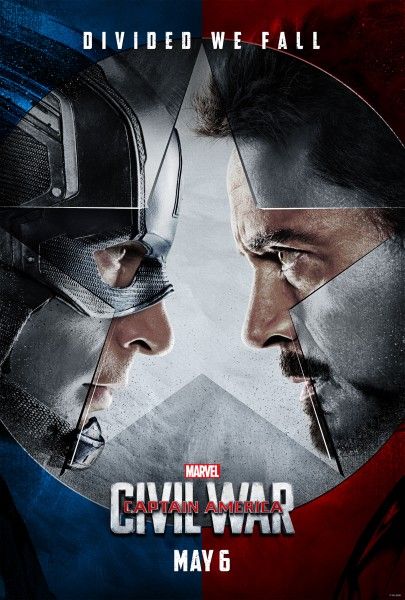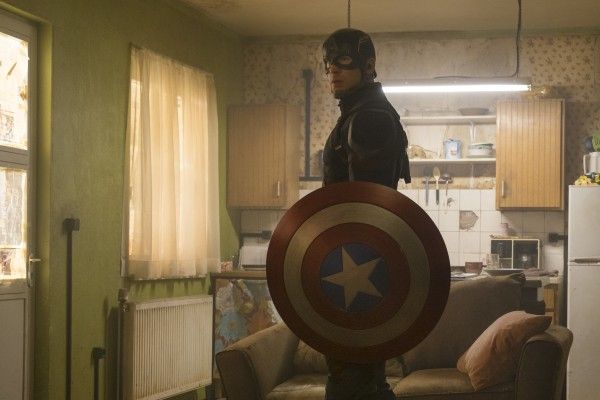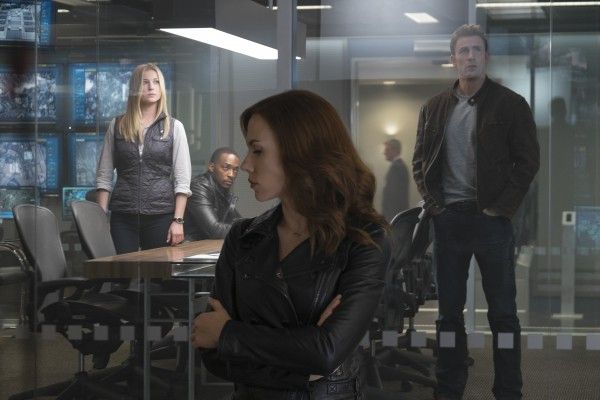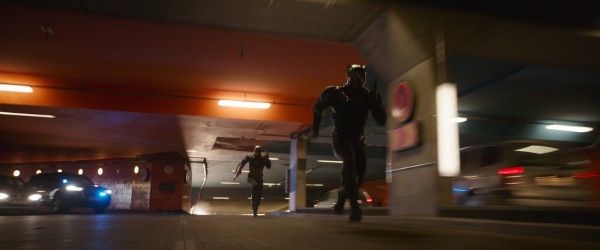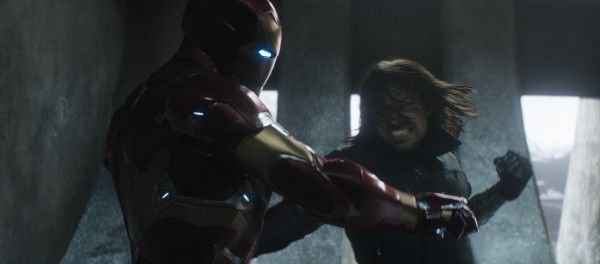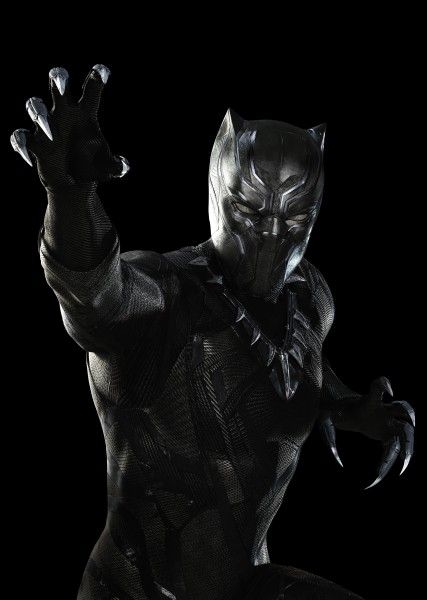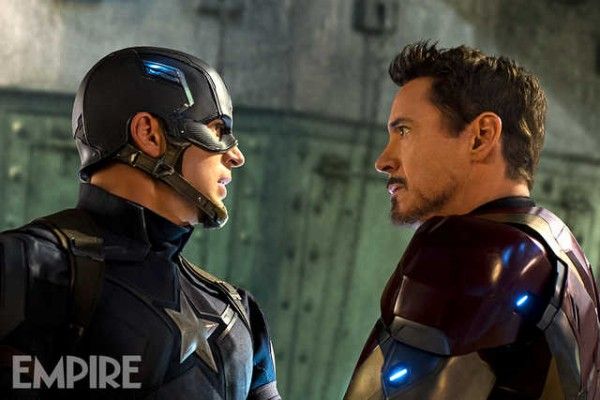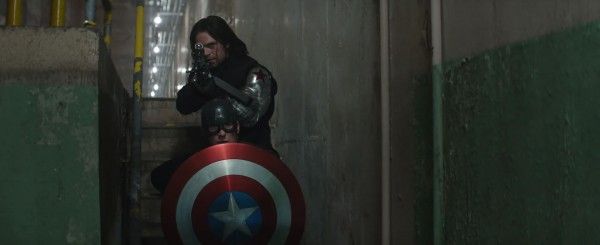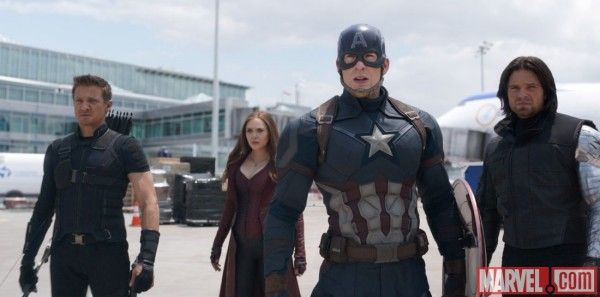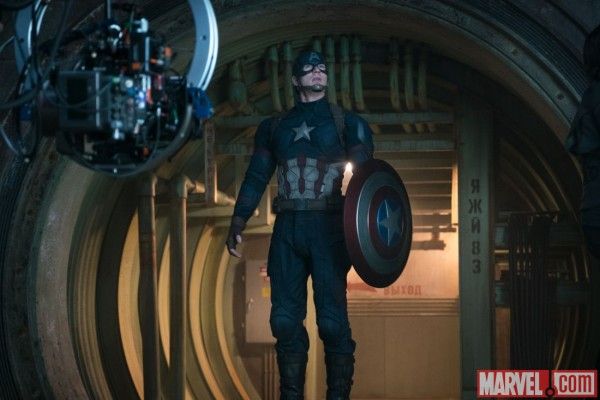While most of the people on the Captain America: Civil War set visit were fairly guarded, producer Nate Moore was refreshingly candid with my fellow reporters and I about the upcoming Marvel film. Moore served as a producer on The Winter Soldier and was closely involved in getting this “big, sprawling epic” of a sequel to the screen. It was a big conversation that revealed a lot of what went into the developing the script for not only Civil War but thinking ahead to future MCU films.
During our interview, Moore talked about trying to organically bring characters into the story, Cap pushing back against America, taking the character out of his comfort zone, trying to hit the sign posters for future movies, and much more. Read the full interview below.
[Apologies for the amount of "inaudibles" on this interview; the room we were in was like a wind tunnel and so the mics picked up a lot of interference.]
So what do you feel like this movie has added to the Marvel cinematic universe that we haven’t seen?
NATE MOORE: There’s two things. Obviously characters like the Black Panther, which is the thing we are most excited to introduce; this guy that we’ve tried to launch in the solo movement before, just hadn’t quite figured out the right story. When we were starting to crack this story, there was an opportunity introduce some cool character who definitely played a different kind of role than being on either Cap’s side or Tony’s side. And the Black Panther seemed like an obvious choice.
But it also, I think, for us pays off the promise of Captain America 2. So, what happens to The Winter Soldier? What happens with Cap’s relationship with The Falcon and The Winter Soldier? It lets us take the next step in Cap’s relationship with Natasha. All those big questions that we really had fun playing with in that film we get to kind of explore more here in a very Cap-centric way. Obviously there’s a ton of other characters; there’s a lot of Avengers in this film. It’s not an Avengers film. It’s a Cap movie. So it really is picking up the pieces of that movie and being a proper trilogy.
What are you seeing from Chad so far that has you excited?
NATE MOORE: The way Chad moves I think is unexpected. So you go, “Black Panther! He’s cool! He’s going to punch people! He’s got claws!” Chad brings a certain movement. And it’s through his own experience with the martial arts that we hadn’t really talked about. And the first day on set we were like, Oh. Well, that’s kind of interesting.” He has a very kind of slick cat-like walk that does feel like Kabuki trying to be a cat but is very much his own thing. I think his accent, the accent for the character is also very singular. In the same way that I think Wanda and Pietro on Avengers 2, the Sokovian accent is something that is very distinct. I think when you hear the Wakandan accent you are going to be like, “I didn’t think about that. That’s right. He wouldn’t speak in perfect American English or British English. He’s going to have his own thing going.” So that’s pretty fun.
This is a film that’s been described to us as a film with the antagonist trying to pick a side. This is sort of the first Marvel film that doesn’t really have a villain. It’s just more ideology driven.
MOORE: Exactly. And that’s what we thought was interesting. You’ve seen them fight world devouring villains like Loki and this hoard of Chitauri, like Ultron and the Ultron drones. What could be more interesting than them turned in on themselves? The time has passed for the larger than life villain. It’s not that we won’t get back to it, because obviously there are other films on the horizon that will deal with a big mass of galactic villains. But this movie had the opportunity to really explore the interpersonal pressure of a world in which The Avengers exists
I mean if you think about it, Avengers were assembled under S.H.I.E.L.D. That makes sense. This organization will control these super-powered heroes for kind of a one-off situation. What happens when S.H.I.E.L.D is gone and all these people who have powers that you and I don’t have are running around sort of unregulated? It seems kind of like a good idea as long as you are on the right side of that. But is everybody comfortable with that? And then once that sort of external pressure is put upon them, how did all these characters who are individuals….all The Avengers don’t agree on everything. We’ve seen that in other films. So when that time of external pressure is put in these very different personalities, Falcon is going to respond very differently from The Widow, which will respond very differently than The Vision, and Tony, and Cap, and so on. So that to us was what’s interesting.
And to have what I think is interesting…what makes it a Cap movie, again, is that external pressure is applied and then The Winter Soldier pops back up. Wait a second. So, all of a sudden, we were already kind of at odds with each other. And now this very true free radical shows back up. We don’t know if he’s a good guy. Is he a bad guy? Does he remember everything? Does he remember nothing? Cap is going to have a very different reaction to that than, say, Widow, or Tony, or Falcon, or Vision because he’s a bad guy to most of the world except for Cap, who goes, “That’s my best friend.”
So I think that’s the dynamic of the movie that’s really fun, is we’re already splitting the team and now they have to deal with this third party.
How does a new character like Ant-Man, a new character like Hawkeye, who we’ve seen leave to spend time with his family, get pulled back into this conflict?
MOORE: Well, I think Ant-Man, once you see the film Ant-Man you’ll understand very clearly the connective tissue. He’s pulled in for a very specific reason by a person who had prior experience with him. Hawkeye, again, when you think about these films, these people have built relationships with each other. So even though I may retire, if you call me for help, for instance, I’ll probably come and help. So you start to lean on, again, the interpersonal dynamics of the characters and go, “OK. What would be the reason for Clint, who just had a kid at the end of Avengers: Age of Ultron, to go…” And Hawkeye. Once again, how do you pull them back into a story that feels organic and natural and interesting and really, again, puts the pressure on the relationships with the characters? And we think we found a really interesting way to do that.
It was sort of a happy accident in starting to develop the script with Markus and McFeely and the Russo Brothers. We pitched out a million different ideas. Obviously there’s a deep bench of great Cap stories that we could pull from. But we also looked at the Marvel Cinematic Universe as a whole. Where have we been? What stories have we told? It felt like it was kind of the right time for Civil War to start to happen, because when you look at the events of Avengers, and Avengers 2, and Thor 2, and Cap 2, there are all these sort of almost world ending experiences. We felt like we had to tell the next step in that story, which is what happened? What is the world’s reaction?
And we always think it’s interesting to push Captain America up against the wall. Something we found in Cap 2, frankly, is we felt Cap was more interesting when he had something to push up against. In that case it was S.H.I.E.L.D that turned out to be corrupt. In this case, it’s the world saying, “This is how The Avengers can be run.” Who better to push up against that kind of pressure than the guy essentially wearing an American flag?
So in trying to tell the best Captain America story, it turned out Civil War actually gave us sort of the impetus for putting him, once again, at odds with the world, which is where I think he’s most effective.
It seems interesting to me that in Cap 2 you took this group that forms The Avengers. Then you had the most amazing government agency. They had access everything. They were unbeatable. Then Cap 2 was about taking those things away. It seems like Cap 3 is taking something else away to where it’s fracturing this crazy superpower group. Is that something that’s intentional?
MOORE: Yeah. Again, it’s about challenging Cap. I think Cap is constantly putting him in situations where he feels protected in the modern world, because he is a soldier. Here’s a guy who went away and came back 70 years later and almost everybody he knew was gone. So it made sense for him to look a soldier with a shield. Well that goes away. What does he do? In Avengers: Age of Ultron, he goes, “Well it doesn’t seem like the family like is what I want. Maybe it’s running The Avengers. Maybe that’s the thing.”
So, again, to give him the maximum amount of drama. It’s like what else can you strip away? Now what happens? So now he found a home in The Avengers. Let’s take that way. Now what does that character do? It really forced Steve Rogers to grow and not just be the leader of The Avengers. We can tell that story and I think that’s fun, and comics have done that for years and have been super successful, but I think for a movie you want to keep drawing the character and pushing the character in ways that are uncomfortable.
Can you talk about the new dynamics of the new Avengers team versus the old team?
MOORE: The old team was brought together, I think, under crisis, and so you meet them real time and they haven’t hung out together. They’re just like, “Hey, we need to go fight Loki. This is happening right now.” If you think about where we find them in this film, we can imagine…we kind of play this…it’s never hard and fast, but like a year of movie time is roughly a year in our time. So they’ve been together. So they’re closer. So Cap, and Falcon, and Wanda, and Natasha, and War Machine, and Vision, they’ve been a group for a year. So they’re probably a little bit closer than that first group of Avengers, who really was just pulled from opposite ends of the earth to do this one thing.
Again, that’s why Civil War is powerful, because it’s not a bunch of people who just met each other arguing. It’s a bunch of people who spent a year together kind of growing as a unit and becoming real friends all of a sudden being pulled apart. So I think those dynamics will feel tighter. It’s more a family now than it probably ever has been in the past. And what happens, again, when that family is torn apart?
You have this group together. How does this film handle introductions? You have Black Panther, but you are also bringing back Thunderbolt Ross. There might be this teenage kid from New York who might come in and do a few things. How do you work all that together?
MOORE: The truth is you do it as organically as possible. Thunderbolt Ross was a fun piece on the board. It had been left behind in a movie that we all internally really liked and we all loved William Hurt. So when there came an opportunity…again, the framework of the story we were going to tell, of, “There is this character who is doing X. You know who would be great for that? Thunderbolt Ross. We haven’t seen him in a while. Let’s make it organic to the storytelling, “rather thang going, “Who do we have in the…that guy. Let’s figure out how to use him.” That to us has never really worked out in our favor when we tried to jam somebody in.
So it really is, “Well, we already have this story. There’s something that needs to be served here. What’s the best character to serve that?” If it’s a new character, great, right? That’s how you get your Agent Coulson’s or your Mariah Hill’s, who was introduced in Avengers 1. If it’s a character we can call back that’s even better because, A, the actor is probably pretty good; we have a really good track record of casting so far. And it’s fun to continue that story as well. What happened to Thunderbolt Ross after The Hulk? It’s left in the ether, right, and sort of fun things to imagine.
For us, it was, “Here’s a way we can tell the continuing story of Thunderbolt Ross and almost give him an arc in the movie.” So every time we introduce or use a character, we want to make sure it’s for the right reason.
And the same with Black Panther and the same with Ant-Man, frankly. It was, “We have an interesting area here where somebody could be doing something. What’s the best version of that? I bet people would love it if we brought back Ant-Man because that movie is going to be really fun. People are going to respond to it. And we need somebody to do that anyway.”
Again, we never want to, as I call it, just fill up the clown car with as many clowns as we can and go, “Look! Look at all these great heroes! Isn’t that cool?” If they don’t have anything to do, no one is going to like that. So it really is, I think, story first and then figuring out how to work the characters in.
I don’t know that you can have an Avengers movie and not feel Fury’s presence, frankly. But, again, it’s what is the story of Nick Fury? What is continuing story? And we do have some sort of bigger ideas for him. In this specific story there is not a natural Nick Fury role to be had. So rather than, again, manufacture a reason for him to come in, for them to go visit him, we didn’t want to sidetrack the movie just to show a character that we all love. We would rather have him sit it out so the next time you see him, it’s for a real good reason.
So now you have two sides that are already kind of fracturing. And now with the arrival of Winter Soldier, I don’t think it’s a stretch to say Cap is going to want to figure out how much Winter Soldier remembers and if he can still get his buddy back. The last time Cap saw Winter Soldier, there’s a glimmer of, “Maybe that guy remembers.” But it’s not for certain. So the first thing Cap is going to do is go find that guy.
Well, if the team has been fractured in such a way that Cap is maybe no longer able to do that legally, it all of a sudden becomes very complicated. Now you have a guy working outside a new world order who finds himself in conflict because of a goal that has nothing to do with that central conflict but ultimately exacerbates that central conflict.
Can you say anything about Spider-Man’s role?
MOORE: I don’t even know if he’s going to be in the movie, honestly.
What’s the most exciting thing about Spider-Man coming into this universe? We do know that he is coming into this universe.
MOORE: I don’t even know if it’s going to happen. Fingers crossed, but…
If it ever does, what will…
[laughter]
MOORE: If it ever happens, I’d be happy to tell you what I think. But so far? Don’t know.
Does the fracturing of the superheroes result in Crossbones showing up?
MOORE: Crossbones is interesting. Again, a character who we all love and an actor we all love. We felt like there was a really good way for him to, once again, kind of fan the conflict that was already brewing. Here’s a guy who is a free radical. Hydra has kind of gone under. He’s sort of doing his own thing now. What happens when he pops back up? He is, I think, probably more unhinged than he was in the last film. He is definitely serving his own agenda. He’s not afraid to kill people along the way. So he becomes almost the spark point for what happens with the rest of the film.
There’s a couple other characters we haven’t heard much about, Daniel and Martin playing two of them. The characters they are playing, are the central to this story or are they sort of like the Black Panther situation where they are being set up for a future film?
MOORE: Both. They both serve a very specific role in this story, but they both have more story to tell that will work beyond this film. Again, they are both fine actors that we were very lucky to get. As you are writing these movies and you find these little roles, these little slots, you go, “Wait a second. This could be a character.” All of a sudden that’s a reason to go, “Hmm. Can we get Martin Freeman to do this?” He’s not going to be in every frame of the movie, but we’re so happy to have him in the universe, because who wouldn’t want to see another version of Martin Freeman down the road?
Black Panther is the first character you guys are spinning off. The logistical issues of that, how does that work, sort of creating the character for this movie but not closing off avenues for his solo film? How do you make sure that works but also make him be satisfying in this picture?
MOORE: The first thing we did is figure out what this story is here. We don’t want to take everything off the table that could be great in this movie. We’d rather write ourselves in the corner and say, “Well, we told that story, so that means that’s off the table in the solo film,” because in his case there are so many great Black Panther stories we can go to for inspiration. But we also want to give enough of that character where you go, if you are a fan, “Man, I really got to see The Black Panther in that movie. And I got to feel T’Challa’s character and the idea of Wakanda and the idea of Vibranium and all that stuff. That was really in this movie. I got to experience it.” There’s still plenty of story that we still have great ideas for the standalone movie. But you get enough of it in this movie that I think you are going to be happy.
At the end of the Age of Ultron, we kind of see Tony seemingly going into retirement and away from the Avengers. What can you tell us about what kind of calls him back?
MOORE: There’s a very specific incident that happens to Tony in the first Act of the film that brings him back. That he says I can no longer, unfortunately he wasn’t retired that long, but I can no longer be retired, I have to once again take an active role. And it’s something that builds through the film so it’s not like something happens and the suits back on. It’s something happens and all of a sudden I’m a step closer to the Avengers. I’m a step closer until ultimately he does have to put the suit on. But it’s very much motivated by an experience he has within the film.
He also has a line in Ultron where he says “the path that I started thus far”. Now that Cap is sort of the leader of this new Avengers. Does he feel more responsibility for the Avengers and their actions?
MOORE: I think he does. Definitely for their actions. I think Cap is probably a little bit more of an individualist, meaning I don’t think he thinks everybody has to do what he’s gonna do so he’s never a dictator who says I believe this, so you guys all have to do this. But I do think he takes very strongly the idea that he is responsible for what their doing. Again, when things start to go wrong, I think he feels it very emotionally and that’s one of the reasons why he is so, I don’t know that we can do what the world is asking us because then we are no longer responsible and I never don’t wanna be responsible for what we do, good, bad and otherwise. If we’ve destroyed something, we should take responsibility. It shouldn’t be because we were sent there and we had no choice.
What you guys are doing, which I think is really interesting, in long form storytelling, you’re deep enough into it now. It’s successful and you probably had a general plan . At what point, Iron Man 2 was like, well, we’ll see where he’s gonna go. Can you talk about the way you approach this, on a story by story basis because you obviously had the larger arc, and then there are things that are fluid within and the character arcs of where things go within the larger arc and how you make sure you’re hitting the beats to get to Infinity War.
MOORE: I think you sort of put your finger on it. There are the big sign posts we know we need to hit and sometimes it's in the case of Cap 2, we knew a big part of that movie we was to follow SHIELD because we kind of knew what Avengers 2 was gonna be about. In this case, we know that Cap 3 is Civil War because we kind of know what Infinity War wants to do. We know how all those details worked out because we want the filmmakers and writers to have a big say in that but we do know that the big sort of storytelling and signposts that we gotta hit or at least get close to to keep that river following. We end up getting together as a collective every year or so, two years sometimes, just to go “Is this right?” “I’m still working on this movie and this is what we’re thinking” “Oh, that means I can do X because ultimately we all know we gotta get to the fifteenth yard line and then “Hmm, in this phase 3 I wanna do this.” “That’s a great idea, I can do this because we gotta get to the goalline. The goal line being kind of Infinity War 1 and 2 so it really is talking out this big story points and still leaving a lot of wiggle room so we can go, in the case of Cap 3, “Hey, we’re gonna use the Black Panther” “Oh, that wasn’t the plan but that’s a great idea” and that honestly has spurred the idea of us being able to do a stand alone but if we’re gonna do Black Panther that means we can do stand alones so let’s move that piece over there. It’s a bit of a fluid process but we do know the big signposts and we do know the bigger plot elements we want to hit, it’s just getting there in a way that doesn’t feel wedged. What we never want to do is say, to a filmmaker or writers, this is what your movie is about. They’re not gonna buy into it and it’s not gonna be the best story telling. It’s “Hey, we think these three ideas is really cool” And they go “Yeah, that would be cool and what if this” and we go “Oh, that’s even better.” So there is a lot of movement in there but the big ideas we know.
Has characters being acted [inaudible] What about Daredevil. As far as we know, he’s not in this movie but do you think we’ll get to a point where now that you’re getting some big additions with, there’s now the Punisher [inaudible]
MOORE: I think it’s possible for sure. It’s interesting that the TV timeline and the film timeline moves so differently because they tell stories so quickly because they have 10 to 22 episodes. So sometimes it’s just hard for those things to line up perfectly but we love that idea of ultimately pay a Luke Cage, Jessica Jones, Daredevil, Punisher, Agents of SHIELD. Maybe there’s a way to get ‘em back in there as long as it makes sense for our storytelling and doesn’t prohibit them from telling a story, we say “oh this happened to Daredevil somewhere in the future” and they go “Well that’s not what the TV show wants us to do” We don’t want that to start to feel like there’s friction so we haven’t figured out how to do it but we’d love to do it.
We’ve been told this is a global adventure, maybe more so than Age of Ultron’s so are you guys going any place that’s really exciting that we haven’t seen these characters in previously?
MOORE: Yeah, we’re trying to. I think Avengers: Age of Ultron does have a great global scope because they go to Korea, they go to Africa. I think in this movie we’ll go to Nigeria, we can’t actually go to Nigeria unfortunately, we’ll go to Germany, we’ll go to other places in Europe. We’ll go to sort of Russia. There is a bit of scope to this movie as well. It’s definitely on par with Age of Ultron and I think the scope of the story may be a little bigger. We like the idea of, especially when you have these kinds of heroes who can do these kinds of things, putting them on a bigger canvas seems to make sense. Cap 2 was a little bit more focused because of the characters involved and it was very much a political thriller so it makes since it was mostly in D.C. and in a very specific place [inaudible]. This is civil war on a global scale so you do get to see some places that we haven’t taken the characters.
Speaking to that political thriller, I think that all the Cap movies, what distinguished them is that they all feel like they’re a separate genre. If the first is like this big action adventure, the second one a political thriller, what would you say this is?
MOORE: This is sort of a political slash psychological thriller. It’s about what happens to these people when they’re put in this pressure cooker. Obviously it has the big action set pieces that are sort of parts of the Marvel movie but it’s not the first Avengers movie. And it’s not as, I think paranoid maybe, as Cap 2 was. It’s a little bit more open. But the tone is very much putting again, these characters in the pressure cooker and seeing what happens to the vision. Is [inaudible] when these things are asked upon them. Or what happens to Ant Man, who comes off of an adventure that maybe we might feel lighter than the Cap universe, is pulled into this pressure cooker so that’s what we think is interesting.
Since there’s so many characters in Cap 3, who do you think will surprise people?
MOORE: It’s hard to say. I think Black Panther will surprise people just because there’s, I think it’s something easier for characters who are less known to be more surprising. I think Panther is gonna be really cool. I think Ant-Man is gonna do some things that are really fun. I think Winter Soldier might steal the show because you get to tell a lot of story. There’s a lot of stories still to be told with Bucky and who he is now versus who he was. And even who he was in World War II. I think that story in a lot of ways is the emotional backbone of the movie. Can this guy be saved or is he unsalvageable? Can he ever find peace or is he always gonna be tortured? That Winter Soldier storyline I think people are really gonna respond to.
How do you sort of service these characters and not make them too powerful? I mean Scarlet Witch could probably just end the Civil War if she wanted to.
MOORE: It’s a challenge. It’s something that we talk a lot about. Who’s more powerful than who and what happens? I think part situational you put ‘em in situations where they're having to make tough choices . I think the other thing to think about, and again this is something that I think the comics, I think tonally don’t have to get as right, which is these people like each other. I’m not trying to beat the shit out of you. I’m not hitting you full blast because why would I do that? I’m trying to stop you, I’m trying to prevent you. So I think it prevents Tony Stark from blasting Hawkeye in the face with repulsors. You’re just not gonna do that. That doesn’t mean you still can’t have a battle that has real stakes and tension but it does mean for characters like Vision, especially, who feels like he is the protector of humanity in some respects, from going full Vision power because are you gonna do that to somebody like Black Widow? Are you gonna do that to Wanda? I don’t know. I mean that’s pretty severe. It is that idea of situational use of power. Of challenging them in ways that are clever. All the tricks in the book are from the table. Tony’s suit of armor can do a million things. Hawkeye has a million bows and arrows. There are ways that we have to, I think, just internally, of challenging these characters to be really be pushed to the brink, without sort of lethal force.
You talked about the long form storytelling and hitting these sign posts and the goal being Infinity War but now there’s so many puzzle pieces in this film and a lot more coming in TV, a lot more coming with new characters in Phase 3, do you also have to be mindful beyond that? And be like, this character, we have to do this for Phase 4, or whatever?
MOORE: Again, to some degree but we would never leave good storytelling off the table if it works good now. Like we’d never go, it’s a great beat here but maybe some day we’ll wanna do that. Well that’s no fun. Maybe someday may be never will come. This is happening. So we try to put as much good stuff in each film as we can. And write ourselves into a new corner and go, “Man, we used that story, that would’ve been cool but it really worked here so what else? And again, the good news is Marvel’s been around for so long, there’s so many good stories to tell, we’d never feel, “Oh, we’re scraping at the bottom of the bucket. We gotta save that one!” It’s like, “OK, we used [inaudible] Winter Soldier. There’s a lot more to that book I would say, than what’s in the movie. It might be hard to repurpose that but you never know. There’s some good elements that we could go “We didn’t use that element, let’s bring that into Cap 4 if we’re so lucky to make that.”
Is Phase 4 a talking point of is it still…
It’s still a little far away, right? I think it’s getting what’s in front of us right first.
I visited the set of the first Captain America and back then [inaudible] saying that he was toying with the possibility of having more World War II stuff in the films as flashbacks and like adventures that we never saw. Is that something that’s still on the table?
MOORE: Absolutely. And we talked about it for this film and unfortunately when you have Civil War there’s not a lot of room for other storytelling but yeah, we’d love that idea. There’s a whole little montage in the first Avenger, Cap 1, where we imagine a year passed, and there were probably a lot of different Avengers we [inaudible], and Peggy and Howard and you could do a lot of stuff in that time. I mean, I have personal favorites like [inaudible] and Master Man and all these great World War II heroes [inaudible] that could be really cool. Will we get to them? I hope so. Are there concrete plans? Not right now but yeah, we’d love that idea.
For more of our Captain America: Civil War set visit coverage, click on the links below:
- ‘Captain America: Civil War': 115 Things to Know about Marvel’s New “Sprawling, Epic” Film
- ‘Captain America: Civil War’ Directors Joe & Anthony Russo on Crafting a Psychological Thriller
- ‘Captain America: Civil War’: Chris Evans & Sebastian Stan on Playing Men out of Time
- ‘Captain America: Civil War’: Robert Downey Jr. on the “Sokovia Accords” and Irreparable Things
- ‘Captain America: Civil War’: Chadwick Boseman on Bringing Black Panther to Life
- ‘Captain America: Civil War’ Screenwriters Explain How This Is Not an ‘Avengers’ Movie
- ‘Captain America: Civil War’: Anthony Mackie on What It Will Take For Him to Buy Grindr
- ‘Captain America: Civil War’: Jeremy Renner and Elizabeth Olsen on Their Characters’ New Lives

